-
Par MissGuillotine le 3 Août 2014 à 21:10
4 August 1327 – First War of Scottish Independence: James Douglas leads a raid into Weardale and almost kills Edward III of England.
1430 –Death of Philip I, Duke of Brabant
1521 – Birth of Pope Urban VII
1530-Determination of the university of Alcala (Complutensis), at an assembly of the faculty of theology in the church of St. Ildefonso, that the marriage with a deceased brother's wife is not contrary to the Divine law, and the Pope can therefore grant a dispensation to allow such marriages. 1530, 4 Aug.
Papal mandate, inhibiting all persons, on pain of excommunication, from writing or intermeddling with the said cause, contrary to their conscience, through hope of reward or favor of any kind. Rome, 4 Aug. 1530.

1532 – The Duchy of Brittany is united to the Kingdom of France.
1549-The Battle of Woodbury Common, which occurred on 4 August 1549, was part of the Prayer Book Rebellion. Reinforcements had arrived on 2 August to assist the king's troops under John Russell, 1st Earl of Bedford, and a thousand Landsknechts (German mercenaries) arrived the following day under the command of Lord William Grey.
The king's army of some 5,000 men began a march from Honiton to relieve Exeter, which was under siege at the time, but instead of taking the heavily barricaded highway, Russell went westward, across the downs. Russell's scouts found their way barred by 2,000 men at Alphington and sent in Captain Travers to clear the road. In the words of Edward VI’s chronicler, John Hayward, those Cornishmen who were disarmed in this assault were “slain like beasts”. Russell’s advance continued onto Woodbury Common, where he pitched camp at a windmill. Here, Paulo Batista Spinola, the Italian commander, kept his men awake all night, fearing a night attack. This actually occurred at dawn the next day, on 4 August, when Devonian and Cornish forces defending Clyst St Mary came out to confront the larger force at the windmill. The difference in numbers and force of arms did nothing to deter them and the second battle of the uprising began. There were heavy losses on both sides and the result was inconclusive but Russell's army took many prisoners, 900 of whom would be executed the next day in the Clyst Heath massacre. This number was confirmed by John Hayward, Edward VI’s own chronicler
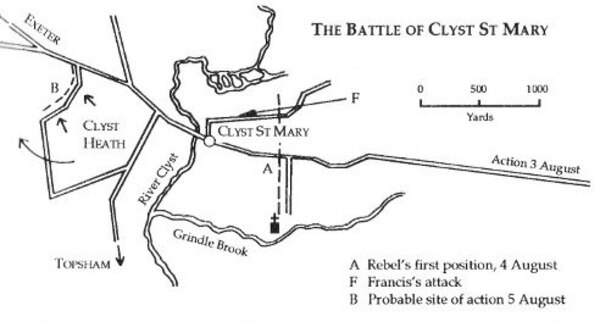
1578 – Death of Sebastian of Portugal

1598 – Death of William Cecil, 1st Baron Burghley,English statesman, the chief advisor of Queen Elizabeth I for most of her reign, twice Secretary of State (1550–1553 and 1558–1572) and Lord High Treasurer from 1572. He was the founder of the Cecil dynasty which has produced many politicians including two Prime Ministers.
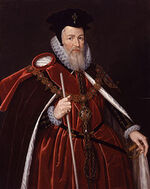
source:http://www.british-history.ac.uk/,wikipedia
-
Par MissGuillotine le 2 Août 2014 à 21:19
03 August 1460 – Death of James II of Scotland
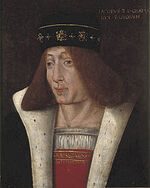
1491 – Birth of Maria of Jülich-Berg
1492 – Christopher Columbus sets sail from Palos de la Frontera, Spain.
1525-Mary queen of France to Wolsey
Asks credence for her servant, George Hampton, the bearer, concerning the detention of her "doole" in France, which her officers cannot collect. Asks him to give Hampton such letters as he desires from the King and himself to persons in France. Wishes the ambassadors in France to have the delivery of them. Wyngfeld Castell, 3 Aug

1527 – The first known letter from North America is sent by John Rut while at St. John's, Newfoundland.
1535-Chapuys to Charles V.
Does not write at length, having written several times lately. Dr. Adam, who is here ambassador for the Lubeckers, sent to me yesterday, by a man whom I had sent to a place he commonly frequents to discover anything he might be getting up here, to say that if I would promise him the favor of the king of the Romans and that of Your Majesty so that he might freely dwell in Germany or elsewhere in Your Majesty's dominions, he would bind himself to secure the kingdom of Denmark either for the duke of Holstein, or for any other whom Your Majesty pleased, without much difficulty. It was in his power to obtain the consent of the Lubeckers, and if he did not perform what he promised, he renounced the liberty which he demanded. He said also that those whom this King was sending to Lubeck and Denmark carried certain articles of peace to reconcile the Lubeckers and the duke of Holstein, which only showed English vanity; also that the courier who came from Lubeck four days ago requested the King, among other matters, not to put forward articles of peace, for the Lubeckers would not hear of it. The said Doctor is now waiting some assurance from me upon the subject, on receiving which he will disclose matters further. I intend to send and tell him that on his doing or declaring something worth while, I will do my best to obtain what he desires, and as to the said matter I could make no promise. I hear that the King is very ill pleased at the rumour of the interview of the Queens, and has since sent in great haste two couriers into France. Cromwell, going to Court lately, left here his steward (mâitre d'hotel) and principal servants, a treasurer of the King, and other gentlemen, to conduct me to the chase, whither he invited me to go; and proclamation has been made by several Councils that no one should go to hunt in the forest until I had been there. By this means they have published almost everywhere the favor that this King wishes to show me, all to spite the French ambassador (a la barbe de lambassadeur de France), and to give the people the impression that Your Majesty is on good terms with this King, and satisfied with what he is doing. I have not yet wished to go to the chase, nor do I know that leave would be given me to visit the Princess, seeing that the chase is round about her, and that I am not allowed to send my men to her. The Princess and the Queen, her mother, are of the same opinion. Cromwell told me at his departure that he would immediately let me know the King's will touching these two points, but the Princess being tired of waiting I have sent to desire an answer; of which, as soon as it comes, I will inform Your Majesty. London, 3 Aug. 1535.
1536-Chapuys to Charles V.
The day before yesterday the King returned to Greenwich from his journey to Dover, during which time he has declined the company either of the French ambassador or myself, although I offered to go with him and the French ambassador was very urgent to be allowed before the King left. After his departure the said ambassador having received letters from his master, sent to solicit an audience, which has been deferred till this morning; and after he left the Court, Cromwell sent to request me on his master's behalf that I would be at 8 tomorrow morning at the Chancellor's lodging, where a part of the Council would assemble. On his own behalf also he very earnestly requested that for the good of affairs and for his honor, considering the long communications we had had, I would show that he had not fought in vain, making overtures and proposals more advantageous to the King his master than I had made hitherto. I shall not fail to go, or to inform your Majesty immediately of all that passes between us. I take, however, the opportunity of this courier to inform you that I fear whatever show the King makes otherwise he will come to no treaty with your Majesty, unless he finds you gain some success, although he is quite of opinion that you will succeed, and it is not long since, as I am told by the Princess and others, that he said in his chamber he was displeased with the king of France for having begun this unjust war and provoked your Majesty to this dance, and that he thought you so virtuous a prince that you would not, unless compelled, have war with any Christian prince. If this be his idea all the arguments of the French to draw him to their side are fruitless, but for all this he has never said anything in his chamber except that he desires to be neutral. He even said this to the Princess when he spoke to her, saying he was asked by your Majesty and by the king of France to declare himself, which he did not mean to do, seeing neither one nor the other would do anything for him. This the King said to her after telling her that perhaps her obstinacy in not yielding to him had been owing to her trust in your Majesty, but she must consider that you could not help her while he was alive, and he asked her particularly if you had ever written to her, or if I had.
The said princess is every day better treated, and was never at greater liberty or more honorably served than now, although her household (estat) has not yet been appointed, which I trust it will be in a few days; she has plenty of company, even of the followers of the little Bastard, who will henceforth pay her Court. Nothing is wanting in her except the name and title of Princess, for all else she will have more fully than before; nor need we make too much of the name seeing that it has not been usual in this kingdom to give such a title to a daughter while there is any hope of male issue, and the Cardinal for some particular reasons had broken that custom in her case. Nevertheless Cromwell says the title will be restored to her before many days, and there is no doubt if she comes to Court she will have both that and everything she can desire for her incomparable beauty, grace, and prudence. And I think that your Majesty's affairs will proceed all the better for it; at all events it will not be for want of goodwill that your affairs do not go on more prosperously than her own.
I sent lately to warn the said Princess that there was some talk of marrying her in this kingdom to some very unsuitable person; and she sent to assure me that she would never make any match without the express consent of your Majesty, protesting that except for some great advantage to the peace of Christendom she would not care to be married at all. London
1536-William and Edmund Walsingham examined Anne Husee on the charge of addressing Henry's daughter Mary as Princess when Anne had stayed with her at Hunsdon, and whether she thought her the lawful daughter of the king. Anne Husee, knowing her head to be in danger if she continued to support Mary, took the more prudent way and besought pardon. 'She most humbly beseecheth his Highness of mercy and forgiveness, as One that is repentant for that she hath so offended and purposeth never hereafter to fall in to semblable danger, – signed Anne Husee, countersigned Edmund Walsyngham. Per me Gulielmum Petre'.

"The examination of the lady Anne Husee, received the 3rd of August."
The substance appears to be that the lady was examined, first, as to how often she had repaired to the "lady Mary" since she lost the name of Princess; and replied, only once since was discharged of her attendance on her, and that was at Whitsuntide last; that she was not sent for then, but, coming up [to London] with lord [Husee] when [he was called] to the parliament, she took the opportunity to visit her; and on the Monday (as she believed) once called for drink for "the Princess," and on Tuesday said "the Princess (meaning the lady Mary) was gone in walking;" but she had called her so merely by inadvertence. She had never heard any other person call her princess since the law had deprived her of that title; nor had heard any one say that the King's marriage with [her mother] was good and lawful, or speak of bona fides parentum, or say that she was the King's lawful daughter. She had never received any message or letters from Mary since she had left her service ; but had received tokens from her and sent her some. She had once received from her "a band for a p. . . ." She had received no message or token from her since her own committal to the Tower. She had thought the marriage between the King and the [Princess Dowager] lawful until it was declared otherwise by law, and she now thought it unlawful. Being asked who were with her during her abode at Hunsdon, she said, "lord Morley . . . . . . . . his wife and daughter, m . . . . . . Shakerley and his wife, with two . . . . . . . . . with them, another merchant . . . . . . . . his wife, Sir Edward B[aynton] . . . ." She is very penitent for having offended, and begs the King's forgiveness.
This paper is both written and signed by lady Husee, and is countersigned by Sir Edmund Walsingham, Wriothesley, and Will. Petre.
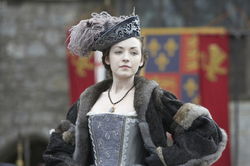
1553 - Queen Mary enters London with her half-sister, Elizabeth triumphant over Lady Jane Grey

1554 - Queen Mary and Philip of Spain set out for London

1562 - Death of John de Vere, 16th Earl of Oxford
1604 – Death of Bernardino de Mendoza, Spanish commander and diplomat
source:The Tudors wiki,http://www.british-history.ac.uk
-
Par MissGuillotine le 1 Août 2014 à 19:43
2 August 1343 – Olivier de Clisson is found guilty of treason and beheaded at Les Halles in Paris. As a result, his wife, Jeanne de Clisson, sold their holding, bought a fleet of ships, and took to the sea as a pirate to seek revenge against the French King and nobility.
1521 - Wolsey arrived in Calais to act as a peacemaker between France and the Holy Roman Empire

1527-Charles V. to Henry VIII
Writes to ask his advice touching the late unfortunate circumstances at Rome. Has done so much for the Holy See that he thinks no sane person can doubt his sincerity. Has borne with injuries done him by France rather than make war for a private cause, and when in Germany refused the petitions of his subjects rather than violate the rights of the Pope. Many evils arose from this; but his conscience is clear, and his cause was vindicated by Leo X. and Hadrian VI. Clement VII., unmindful of favors, has sanctioned a league against him to drive his army out of Italy, and deprive him of Naples. Warned the Pope and Cardinals, before he took up arms, that the guilt would be theirs; but they not only despised his warnings, but violated the truce which Hugo Moncada made with them. The Pope having occupied several places in Naples, Charles's soldiers attacked Rome without his orders, and compelled the Pope to make an eight months' truce with the Viceroy. Although the conditions showed how much the Pope's advisers were opposed to him, Charles ratified it rather than take that vengeance which was in his power. But the soldiers, fearing this truce would be broken like the former, notwithstanding the remon- strances of their leaders, attacked Rome, and committed the outrage of which Henry has heard. Does not believe, however, it is so great as his maligners say. Is persuaded it was God's judgment rather than man's will, to punish the many injuries done to the Emperor; but is grieved at having gained such a lamentable victory. Hopes God will turn it to good, and thanks Him for what He does or suffers to be done. Valladolid, 2 Aug. 1527.
1581-Execution of Richard Atkins.He was an English Protestant martyr.He was charged with exclaiming against the catholic religion and the pope in public places of resort, and with an act of sacrilege in attempting to throw down the sacrament while being carried through the streets by a priest. It was also stated that a few days later, he had gone to St. Peter's once again, while divers gentlemen and others were hearing mass, he stepped forward to the altar ‘and threw down the chalice with the wine,’ and strove to pull the cake out of the priest's hand before its consecration. Being committed to prison a second time and examined, his reply was ‘that he came purposely to rebuke the pope's wickedness and their idolatry.’ After many exhortations by his own country men to recant, but in vain, he was brought to the stake with many tortures and burned before St. Peter's, 2 Aug. 1581.
1589-Death of Henri III of France

1595 - The Battle of Cornwall.
The Battle of Cornwall was a Spanish raid on Cornwall in 1595 during the Anglo-Spanish war of 1585-1604. It was conducted by a Spanish naval squadron from Brittany, France.
source:http://www.british-history.ac.uk/,wikipedia,the tudors wiki
-
Par MissGuillotine le 31 Juillet 2014 à 21:19
31 July 1192 – Richard the Lionheart landed on Jaffa and defeated the army of Saladin
1402 – Death of Edmund of Langley, 1st Duke of York, son of Edward III of England and Philippa of Hainault

1464 – Death of Cosimo de' Medici, Italian ruler
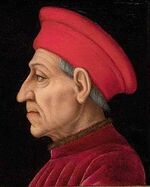
1498 – Christopher Columbus becomes the first European to visit what is now Venezuela.

1527-Henry VIII to Anne Boleyn
For a present so beautiful that nothing could be more so I thank you most heartily, not only for the splendid diamond and the ship in which the solitary damsel is tossed about, but also for the pretty interpretation and too humble submission made by your benignity. I should have found it difficult to merit this but for your humanity and favor, which I have sought and will seek to preserve by every kindness possible to me; and this is my firm intention and hope, according to the motto, Aut illic aut nullibi. Your letter, and the demonstrations of your affection, are so cordial that they bind me to honor, love and serve you. I desire also, if at any time I have offended you, that you will give me the same absolution that you ask, assuring you that henceforth my heart shall be devoted to you only. I wish my body also could be. God can do it if he pleases, to whom I pray once a day that it may be, and hope at length to be heard. "Escripte de la main du secretaire qui en ceur, corps et volonte est vostre loiall et plus assure serviteure

The time seems so long since I heard of your good health and of you, that I send the bearer to be better ascertained of your health and your purpose; for since my last parting from you I have been told you have quite given up the intention of coming to court, either with your mother or otherwise. If so, I cannot wonder sufficiently; for I have committed no offence against you, and it is very little return for the great love I bear you to deny me the presence of the woman I esteem most of all the world. If you love me as I hope you do, our separation should be painful to you. I trust your absence is not wilful on your part; for if so, I can but lament my ill fortune, and by degrees abate my great folly.

1528-Henry VIII to Anne Boleyn
Writes to tell her of the great "elengenes" he finds since her departure, "for, I ensure you, me thinketh the time lenger since your departing now last than I was wont to do a whole fortnight." Could not have thought so short an absence would have so grieved him, but is comforted now he is coming towards her; "insomuch that my book maketh substantially for my matter; in token whereof I have spent above four hours this day, which caused me to write the shorter letter to you at this time by cause of some pain in my head. Wishing myself specially an evening in my sweetheart's arms, whose pretty dubbys I trust shortly to cusse."

1530-THE DIVORCE.
Papal mandate, inhibiting all persons, on pain of excommunication, from writing or intermeddling with the said cause, contrary to their conscience, through hope of reward or favor of any kind.

1536-Lady Bryan to Cromwell.
I beseech you to be good lord to me now in the greatest need that ever [was], for it hath pleased God to take from me him ("hem") that was my most com[fort] in this world, to my great heaviness, Jesu have mercy on his soul, a[nd] I am succourless and as a redeless creature but for my great trust in the King and your good lordship. When your lordship was last here you bade me not mistrust the King or you, which gave me great comfort, and encourages me now to show you my poor mind. When my lady Mary was born the King appointed me lady Mistress, and made me a baroness; "And so I have been a m[other] to the children his Grace have had since." Now, as my lady Elizabeth is put from that degree she was in, and what degree she is at now I know not but by hearsay, I know not how to order her or myself, or her women or grooms. I beg you to be good lord to her and hers, and that she may have raiment, for she has neither gown nor kirtle nor petticoat, nor linen for smocks, nor kerchiefs, sleeves, rails, bodystychets, handkerchiefs, mufflers, nor "begens." "All thys har Graces mostake I have dreven of as long as I can, that, be my trothe, I cannot drive it no lenger."
Mr. Shelton says he is master of this house. "What fashion that shal be I cannot tel, for I have not sen it afore." I trust to your lordship, who, as every man reports, loveth honor, to see this house honorably ordered, "howsom ever it hath been aforetime." If the head of [the same] know what honor meaneth it will be the better ordered; if not, it will be hard to bring it to pass. Mr. Shelton would have my lady Elizabeth to dine and sup every day at the board of estate. It is not meet for a child of her age to keep such rule. If she do, I dare not take it upon me to keep her Grace in health; for she will see divers meats, fruits, and wine, that it will be hard for me to refrain her from. "Ye know, my lord, there is no place of correction there; and she is too young to correct greatly." I beg she may have a good mess of meat to her own lodging, with a good dish or two meet for her to eat of; and the reversion of the mess shall satisfy her women, a gentleman usher, and a groom; "which been eleven persons on her side." This will also be more economical.
My lady has great pain with her teeth, which come very slowly. This makes me give her her own way more than I would. "I trust to God and her teeth were well graft to have her Grace after another fashion than she is yet; so, as I trust, the King's Grace shall have great comfort in her Grace. For she is as toward a child and as gentle of conditions as ever I knew any in my life, Jesu preserve her Grace. As for a day or two at a hey time or whansomever it shall please the King's Grace to have her set abroad, I trust so to endeavour me that she shall so do as shall be to the King's honor and hers; and then after to take her ease again. I think Mr. Shelton will not be content with this. He may not know it is my desire, but that it is the King's pleasure and yours it should be so." From Hunsdon with the evil hand of your daily bede woman.
Apologises for her boldness in writing thus.

1541 – Death of Simon Grynaeus, German theologian and scholar
1545 –Birth of Andrew Melville, Scottish theologian and scholar

1555 – Birth of Edward Kelley, English spirit medium
1589 – Death of Jacques Clément, assassin of Henry III of France
source:wikipedia,http://www.british-history.ac.uk/
-
Par MissGuillotine le 30 Juillet 2014 à 20:51
31 July 1423 – Hundred Years' War: Battle of Cravant – the French army is defeated by the English at Cravant on the banks of the river Yonne.
1451 – Jacques Cœur is arrested by order of Charles VII of France.
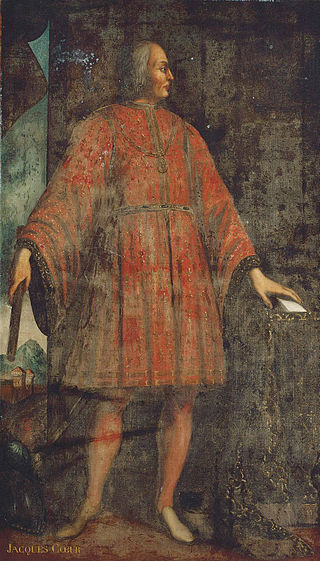
1498 – On his third voyage to the Western Hemisphere, Christopher Columbus becomes the first European to discover the island of Trinidad.
1527 –Birth of Maximilian II, Holy Roman Emperor
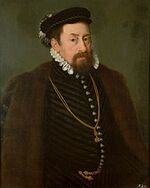
1540-Henry VIII. to Wallop and Carne.
Since his last advertisement of affairs here, things have occurred which are to be declared to the French king and others. Upon the petition of Parliament being declared to lady Anne of Cleves, she agreed to the decision of the matter by the clergy, who gave sentence that the marriage was not vailable. If causes are asked for, they may say, as they did to the cardinal of Ferrare, that the King would not do anything that could not lawfully be bidden by, and it is sufficient that the cause is known to those who had the examination thereof, who in this case are fully to be trusted. Lady Anne approved the sentence, confessing the integrity of her body, and refusing all who would move her to the contrary, and desired to remain here as a servant and subject. Informed her that she could not remain Queen, but, for the honour of her house and respect for herself, he would entertain her as a sister in honourable estate; and sent her a token, for which she wrote a gentle letter of thanks. Has assigned her lands, with two goodly houses and an allowance of 500l., a year, amounting in all to 5,000 marks a year. She is quietly established in her own house as the King's sister, being resolved not to return, as she herself has written to her brother. Sends a small memorial for their better information.
Having received their letters of the 13th, which state that the ambassadors of Cleve are departed and recount the conversation of Wallop's secretary with the queen of Navarre, desires Carne to take leave of the French king and return, and also to take leave of the queen of Navarre, Wallop asking her to tell Carne the matter which she mentioned as something which the King would be contented to hear, and which would make him laugh.
1544-Catherine Parr to Henry VIII
This afternoon came letters from the Lieutenant of the North declaring the apprehension, by fishermen of Rye, of a Scottish ship wherein were certain Frenchmen and Scots sent with letters and credence to the French king and others. Thinks their apprehension much important, and ordained of God to show the "crafty dealing and juggling of that nation." Encloses the most important of the letters, of which there are many to the French king and others, from the Dowager and others, but they are only for credence or else to the same effect as these. The Council have sent for the chief of the Scots and Frenchmen for examination. The Prince and the rest of the King's children are in good health. Hampton Court, 31 July

Princess Elizabeth to the Queen.
Inimical fortune,envious fortune for a whole year deprived me of your presence and, not content therewith, has again despoiled me of that benefit. Knows she has the Queen's love who, she hears, has not forgotten her in writing to the King. Begs the Queen "che scrivendo a sua Maesta si degni de raccomend[armel prie]gando sempre sua dolce benediccione; similmente pri[eghando i]l Signore Iddio gli mandi successo bonissimo, acquis[tando vittoria de] suoi inimici, accioche piu presto possia vostra A[ltezza et io insiem]e con lei rallegrarsi del suo felice retorno. N[on altro priegho Id]dio che conserve sua Illustrissima Altezza, alla cui gr[atia, humilmente b]asciando le mani, m'offero et raccom[mendo. Da Santo] Jacobo, alli 31 di Julio.
From The Anne Boleyn Files:
Inimical fortune, envious of all good and ever revolving human affairs, has deprived me for a whole year of your most illustrious presence, and, not thus content, has yet again robbed me of the same good; which thing would be intolerable to me, did I not hope to enjoy it very soon. And in this my exile I well know that the clemency of your highness has had as much care and solicitude for my health as the king’s majesty himself. By which thing I am not only bound to serve you, but also to revere you with filial love, since I understand that your most illustrious highness has not forgotten me every time you requested from you. For heretofore I have not dared to write to him. Wherefore I now humbly pray your most excellent highness, that, when you write to his majesty, you will condescend to recommend me to him, praying ever for his sweet benediction, and similarly entreating our Lord God to send him best success, and the obtaining of victory over his enemies, so that your highness and I may, as soon as possible, rejoice together with him on his happy return. No less pray I God, that He would preserve your most illustrious highness; to Whose grace, humbly kissing your hands, I offer and recommend myself.

1588 – The Spanish Armada is spotted off the coast of England.
source:wikipedia,http://www.british-history.ac.uk/,the anne boleyn files
 Suivre le flux RSS des articles de cette rubrique
Suivre le flux RSS des articles de cette rubrique




